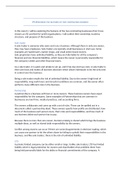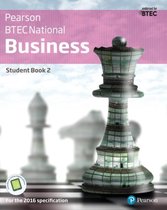P1-EXPLORING THE FEATURES OF TWO CONTRASTING BUSINESS
In this report, I will be exploring the features of the two contrasting businesses that I have
chosen as LTD and Not-for-profit organisations. I will outline their ownership, business
structure, and purpose of the business.
Sole trader
A sole trader is someone who owns and runs a business. Although there is only one owner,
they may have employees. Sole traders are typically small businesses or start-ups. Some
examples are hairdressers, barber shops, and small online brand owners.
Sole proprietors have unlimited liability, as they are fully liable for all the company’s
financial and non-financial liabilities, which means the owner is personally responsible for
the company’s debts and other financial losses.
As a sole trader, it is quick and simple to set up, and it has low start-up costs. A sole trader is
their own boss and makes all business decisions which allows individuals to be the only ones
in control over the business.
Being a sole trader entails the risk of unlimited liability. Due to the owner's high level of
responsibility, long work hours and stressful conditions are common, and the owner often
performs many different roles in the business.
Partnership
A partnership is a business with two or more owners. These business owners have equal
responsibility for the company. Some examples of Partnerships that are common in
businesses are law firms, medical practices, and accounting firms.
The owners collaborate and come up with a set of rules. These can be spelled out in a
document called a partnership deed. These owners specify how profits are distributed, how
much of the business each person owns, their roles and responsibilities, and how much of
any business debts each person has to pay.
Because there is more than one owner, decision-making is shared which brings the business
multiple ideas, as well as shared debt responsibility by the owners.
Conflict among owners can occur if there are some disagreements in decision-making, which
can cause one partner to let the others down by failing to uphold their responsibilities in the
business, and like sole traders, there is the risk of unlimited liability.
LTD
A private limited company can be either small or large. Unlike sole traders, LTD has limited
liability which is legal protection for owners and shareholders that prohibits them from
being held personally liable for the debts or financial commitments of the company. A
, private limited company can be formed by any type of business, such as a plumber,
hairdresser, lawyer, and photographer.
The owners' liability is limited. It lets people be their own bosses, and any new owners must
be invited, shielding the company from outside interference. To raise funds, shares in the
company can be sold.
There is frequently more paperwork in some cases, other people can view the business'
financial information, it can be time-consuming to set up the business, and it may require
outside professional help to manage its finances.
PLC
Large businesses may decide to become a public limited company (Plc) as becoming a PLC
comes with a great advantage because shares are sold to the general public on the stock
market which means shareholders who own shares become part owners of the company
and have every right to take decision making of the business of how to run it.
The company is able to raise additional funds through share capital. The shareholders'
liability is limited. Because larger businesses can achieve economies of scale, there are more
price negotiation opportunities with suppliers.
It is costly to establish, requiring a minimum of £50,000 to get started. Accounting and
reporting requirements have become more complex. There is a greater possibility of a
hostile takeover by a competitor.
Limited liability
The phrase "limited liability" refers to the fact that the business owner or owners are only
liable for business debts up to the amount of their financial investment in the company. The
limited liability applies only to certain types of businesses, such as private limited
companies.
Unlimited liability
The term "unlimited liability" is linked to the fact that the company's owner or owners are
personally accountable for all of the company's obligations, no matter how large they are.
The key distinction between unlimited and restricted liability is the amount of risk a firm is
willing to take. Any firm that has limitless responsibility faces a greater risk than one that
has restricted liability.
Adidas (Ownership and Liabilities)
Adidas is a business that has unlimited liability, it is a German multinational corporation
founded in 1924 by Adolf Dassler. Shoes, apparel, and accessories are designed and
manufactured by the company. It is Europe's largest sportswear company and the world's
second largest. In 1995, Adidas became a public limited company after 6 years of becoming
a corporation, which has increased its reputation and helped the company to raise capital to
invest in future expansion.
Aims and objectives





